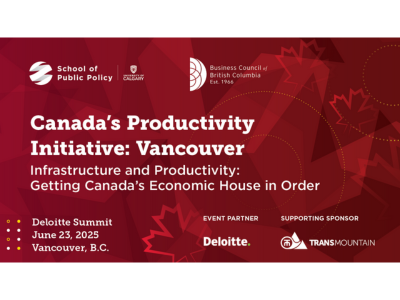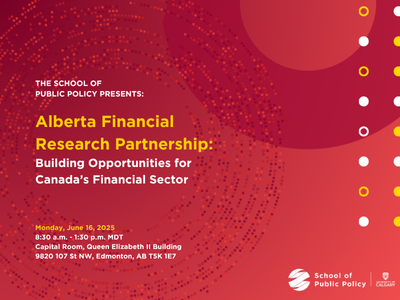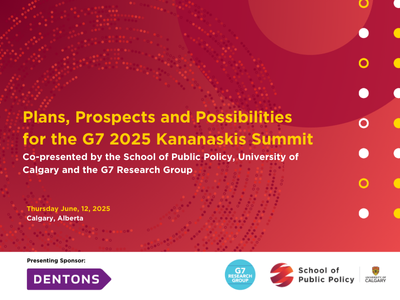Shoulder to Shoulder: Canada and the UK – Partners in a Changing World
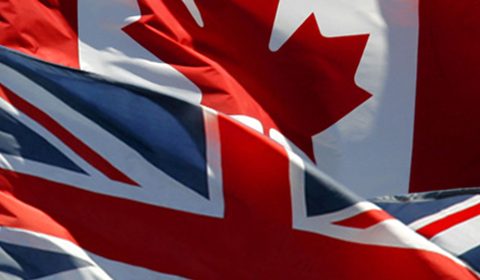
The School of Public Policy, in partnership with the Faculty of Law and the Haskayne School of Business at the University of Calgary, Canada, invites you attend a conference that will explore these options and flesh out practical policy routes to strengthening the Canada-U.K. relationship. Co-hosted with the support of Goodenough College and the British Consulate-General in Calgary, the event will feature expert panels, and encourage focused, frank and real-world debate on what is possible, and how.
Topics include:
The Future of Trade and Investment – Dark Clouds over Global Trade
Canada and the U.K. have benefitted greatly from the post-war global order. But that order has been disrupted, leaving Canada and the U.K. in a difficult position. The U.S. and China are engaged in a trade war damaging to themselves, the global economy and the international trading system. Compounding things are America’s newfound partiality for protectionism and bilateral trade deals, the fundamental incompatibility of China’s socialist market economy with the liberal international trading system, and the WTO’s fragility. These forces have created an atmosphere of economic uncertainty for the U.K. and Canada, two countries heavily reliant on trade. What can countries our size do in this new reality? How can we address rising skepticism of globalization and trade? Can the multilateral trading system be saved? This session will look at the dark clouds hanging over the global trading system and what it could mean for Canada and the U.K.
The Future of Energy – Global Energy Transition
London is arguably the most important financial market in the world. Calgary is Canada’s undisputed energy capital and is home to head offices of energy companies with operations in Canada and around the world. The global energy business is under increasing pressure to address climate change as well as other environmental, social and governance (ESG) issues. This pressure is sometimes felt differently in London than elsewhere. This session will explore the climate and ESG dynamic between London, Calgary and the rest of the world.
The Future of Health Care – The Role of Patients in Decision Making
Citizen participation in the development of health plans, the allocation of health resources and the governance of health organizations has long history and has been heavily researched and commented upon. In most mature health systems, the movement has been well-established since the 1980s and is still very much alive. Patients, on the other hand, have only recently gained some real influence in health policy making. Not long ago, it was difficult to hear patient voices in decisions directly affecting their personal care or wellbeing, let alone influencing policy discussions. This panel will attempt to document and evaluate recent innovations in Canada and in the U.K. regarding patient engagement in health care decision making, from the bedside to the policy-making bodies, and map out issues and options.
The Future of Financial Markets – How Effective is Regulating Crypto?
Crytpo asset trading infrastructure has shown vulnerability to hacking, fraud and manipulation. Regulators in Canada and the United Kingdom have been conducting consultations to assess the risk in crypto asset trading, and are taking very different views of whether they have the authority to regulate them. Hanging over these debates is the risk that any regulation may be ineffective given the ease with which crypto businesses can move to other jurisdictions. One approach to regulating novel financial technologies, like crypto currencies, has been the invention of regulatory “sandboxes”. The first was created in the U.K. in 2016; it was followed by the creation of a similar structure in Canada the next year. Are regulatory sandboxes a genuine innovation? Are they doing the job of encouraging financial innovation while protecting the public? Are there differences in the way these sandboxes work in Canada and the U.K.? Are there lessons that both jurisdictions can learn from other international sandboxes?
WHERE:
Goodenough College
Mecklenburgh Square
London WC1N 2AB
Click HERE to view the current agenda
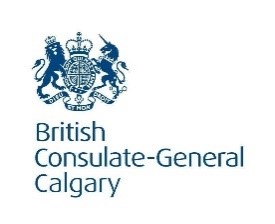

![]()

